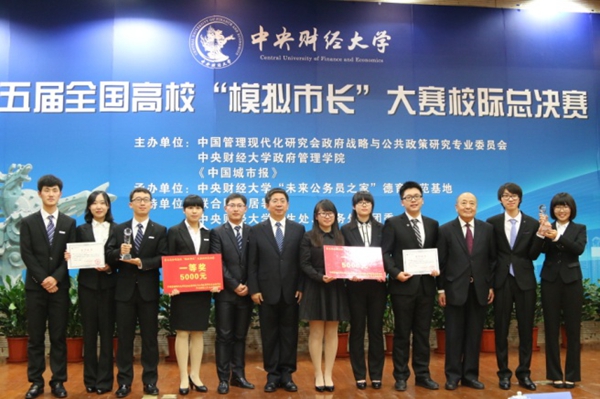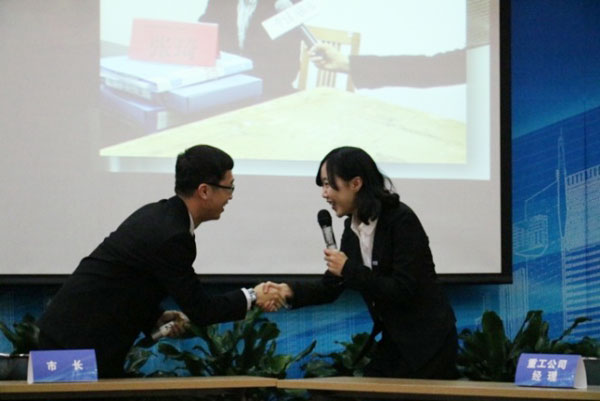 |
|
Students and judges at the award ceremony for the "If I Were Mayor" competition. [Photo provided to chinadaily.com.cn] |
The urban environment was a key topic of discussion between mayors and student would-be mayors at a competition in Beijing on Sunday.
Nine teams from seven universities across China attended the final round of the "If I Were Mayor" competition sponsored by the Central University of Finance and Economics. The event aims to let students, by thinking and acting as a mayor, offer advice to urban and rural governments.
It was the first time that three city governors were invited to share opinions on city management.
A low carbon economy, circular economy and sponge cities among other topics were studied during participants' months-long field surveys at governmental institutions, communities and factories. They presented their research in the form of a thesis, video presentation and a five-minute playlet.
Students from Shandong University introduced Yantai city in East China's Shandong province achieving a low carbon economy by trading carbon emission rights derived from environmental-friendly methane-generating pits at a carbon market. The city, through developing a methane industry and creating a carbon market, adjusted its industrial structure, nurtured emerging industries such as the environmental protection industry and green financial industry, and increased employment.
As a traditional industrial base and one of the first circular economy experimental regions, Dalian in Northeast China's Liaoning province invited some foreign companies to share advanced technologies with other companies by settling them at a circular economy demonstration base, according to the presentation by Peking University.
Zhongnan University of Economics and Law offered Wuhan city's experience of building a sponge city. Wuhan in Central China's Hubei province was one of the first cities to tackle water logging. It combined the forces of water, forestry and urban development authorities under a central leading group of city level to jointly work out city construction plans, which avoid repetitive construction.
 |
|
Students from Shandong University perform a play in the "If I Were Mayor" competition. [Photo provided to chinadaily.com.cn] |
Zhang Jifu, Municipal Party Secretary of Datong city, North China's Shanxi province and one of the judges, raised a question that he "usually encounters in work" for nine student-mayors. "If a big company wants to build a plant in your city, which will bring a substantial profit but have a high environmental pollution risk, would you, as a city mayor, approve it or not?"
Many replied that they would carry out an environmental assessment before making a decision and emphasized the importance of supervision and technical treatment on its potential environmental pollution.
"There is no standard answer," said Qi Jiabin, a member of the Standing Committee of Qingdao Municipal Committee, East China's Shandong province, adding that a mayor must weigh a balance between economic benefit and environmental risk.
"The key is to develop a procedure in decision-making which includes listening to professional and public opinions", said Qi.
"We must insist on a green economy and sustainable development," added another judge, Liang Shuqin, vice mayor of Chifeng city, North China's Inner Mongolia autonomous region. "Pollution-treating costs should be part of the cost of running a business and companies who use industrial waste as a raw material should get tax deductions and exemptions".
The competition, held annually since 2011, attracted more than 90 teams. It helps participants better understand policy-making and governmental management and nurtures future mayors.
